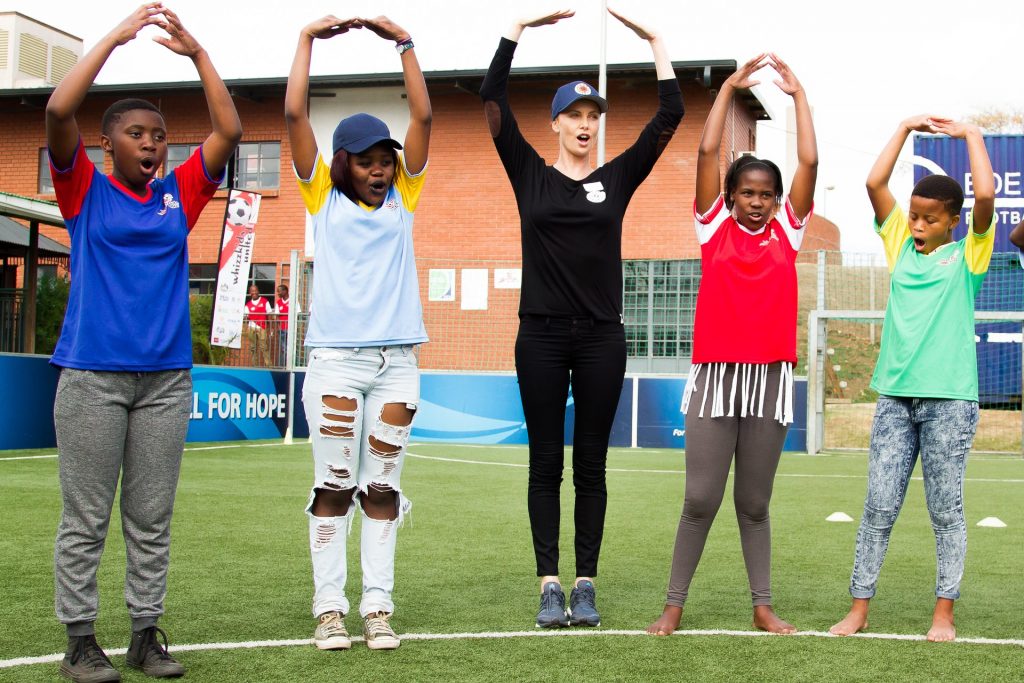
Photograph: Leigh Page
Racism is one of the underlying causes of the HIV epidemic and one of the reasons why it has not yet been brought to an end, according to actress and Aids campaigner Charlize Theron, who says that people are afraid to talk about it.
Theron, one of the speakers at the official opening of the International Aids Conference in Durban on Monday night, is South African by birth and started a foundation in 2007 to help prevent adolescents and young people becoming infected with HIV in ever greater numbers.
In an interview with the Guardian, she said increased funding was very important in the effort to end Aids. “But at the same time I also think that there are very fundamental issues like stigma, and there’s a racial part of it too that I think we haven’t really talked about or people are too scared to talk about.
“HIV the virus doesn’t know the difference between black skin and white skin and when we look at how it’s so disproportionately affected people, we have to look at the racial issue. We [also] have to look at the fact that women are just thought of as less than men globally. These are all real drivers.
“There are things that we have been too scared to openly talk about and I’m hoping to start that conversation.”
Theron’s early and teenage years were lived in the shadow of a growing HIV epidemic in South Africa. “I have very vivid memories [of] being very young and being affected by what was happening. I don’t think anyone at that time knew what it was and I think that was what was so incredibly scary. But it left quite an impression on me that stayed with me for the rest of my life,” she said.
As she grew older, she learned how disproportionately Africa had been affected, she said. “As a South African that’s very hard to un-know. Once you know that, you want to be a part of the solution somehow. I feel like from the very time I could remember, Aids and HIV have had an impact on me. I’m talking about my early teenage years so this is before I was really travelling. But my parents were avid news-watchers and newspaper readers so that conversation was constantly happening in our house.”
Botswana was hit earlier than South Africa, she said. “But that news was travelling into South Africa and so I think it started from the outside – people talking about it and not understanding why people were dying at that alarming rate.
“You heard stories, people talking about family members. At that time it was very much like – ‘Oh, they have TB.’ It became very suspicious. There was such a huge underlying thing that everybody wanted to make it a gay virus and I think for me, watching the deaths in South Africa, we realised that that was so utterly ridiculous – to specify it like that to just one group was so out of place and so wrong. And I think South Africans felt that early on.”
Theron grew up on her parents’ farm in Benoni, in what was then the Transvaal. In 1991, her abusive, alcoholic father attacked her mother, who shot and killed him in self-defence. Theron’s mother was not charged. She moved to Europe with her children and then the United States, where Theron learned American-accented English and became a Hollywood actress. She won an Academy award for her role as a serial killer in the film Monster in 2003.
The Charlize Theron Africa Outreach Project aims to help children and young people safeguard themselves against HIV. Theron calls it “investment in African youth … so that they can ultimately make good decisions for themselves and stay HIV free”.
In the impoverished township of Edendale, Pietermaritzburg, the foundation funds WhizzKids United, a project started by British HIV nurse Marcus McGilvray. It aims to help children and adolescents diagnosed with HIV and build their confidence, self-esteem and knowledge of the virus, so they can protect themselves; it uses football games to teach them about life’s obstacles and the pursuit of goals.
Theron said the understandable drive to get 17 million people – so far – on Aids drugs that keep them alive meant that preventing young people from becoming infected had been neglected.
“I’m starting to get somewhat angry that we haven’t been able to step up our game,” she said on a visit to the Edendale project. “Aids is completely preventable.”
She said families and schools need to discuss HIV and sex, and that young people needed adolescent-friendly clinics so that they are not afraid to seek help because of adult disapproval.
“Not only is the youth really burdened by this disease but they are ultimately the ones that need to be empowered so that they can actually be the generation to stop it. They’ve been carrying this burden so long by themselves. We were really late to the game when it came to adolescents.”

